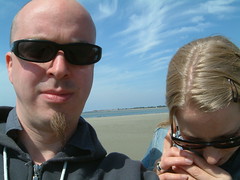
Those of you who have read M Scott Peck's seminal book, The Road Less Travelled, will know that he has a whole section on love.
His theory is that what most people call love actually isn't love at all, it's what he calls cathecting. Cathecting, for Peck, is the early stage in a relationship where the heady rush of feelings and emotions sweeps you along. This stage always, always, in any relationship, ends at some point. This is the point that a lot of people bale out of a relationship saying things like "my feelings have changed" or "I don't feel the same about you anymore" or "I don't love you anymore". Our culture makes a direct equivalence between these cathecting feelings and love. But they're not the same.
For Peck, when the cathecting feelings fade that's the point where real love begins. Cathecting is nature's way of getting us together. But it's not to be mistaken for love. Love is the deliberate choosing of the will to be with, and serve, another person despite our feelings - which will ebb and flow in any relationship.
Recently I've been reflecting on this in the light of my relationship with Christ and particularly my worship of Christ. It seems to me that much of the corporate worship I have participated in attempts to keep people in the cathecting stage of relating to God. It's very feelings based, it's often quite romantic. People have talked about the Jesus is my boyfriend/girlfriend type worship songs that are around.
Sometimes it's easy to feel that your relationship with Christ is failing because "it's not like it used to be". I don't think it is necessarily failing, it's changing, it's maturing. I am worried about churches which encourage people to think that if you're not cathecting with Christ you're lukewarm.
Of course, relationships that last involve work, making an effort, keeping romance alive etc. and there will be an element of that sort of thing in our relating to God, but it's a very different thing to the early, cathecting stage.

No comments:
Post a Comment